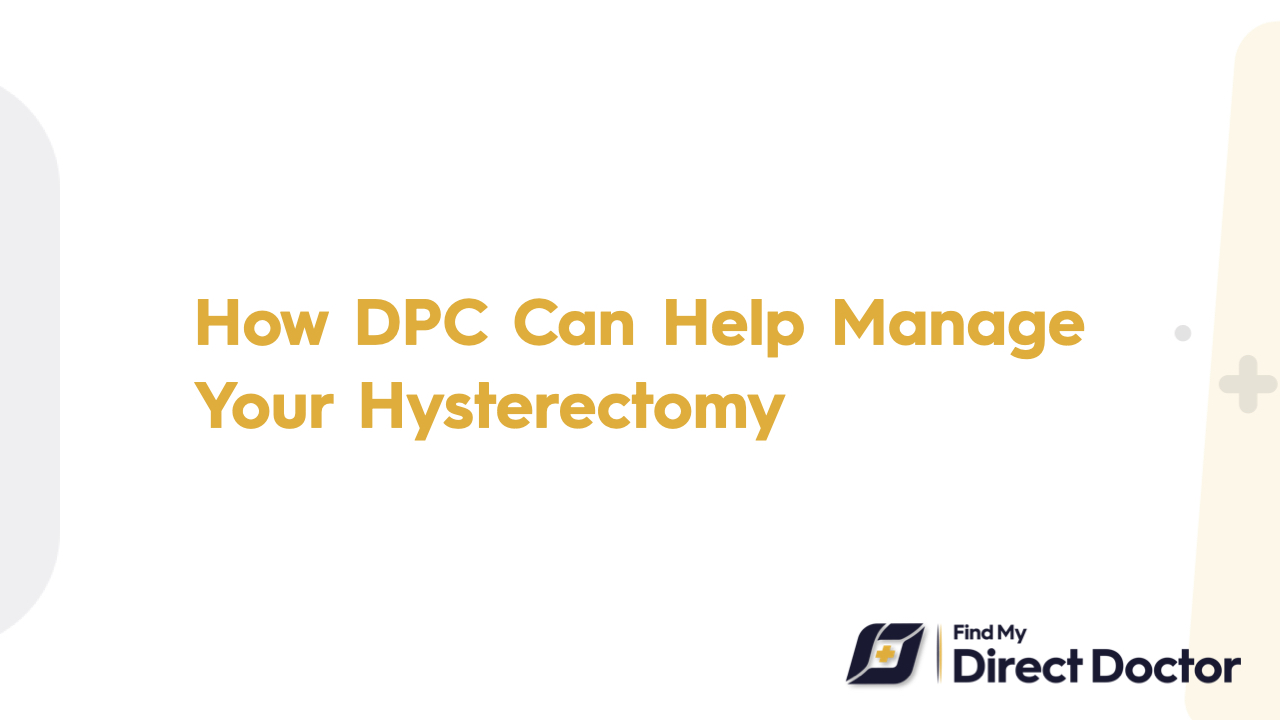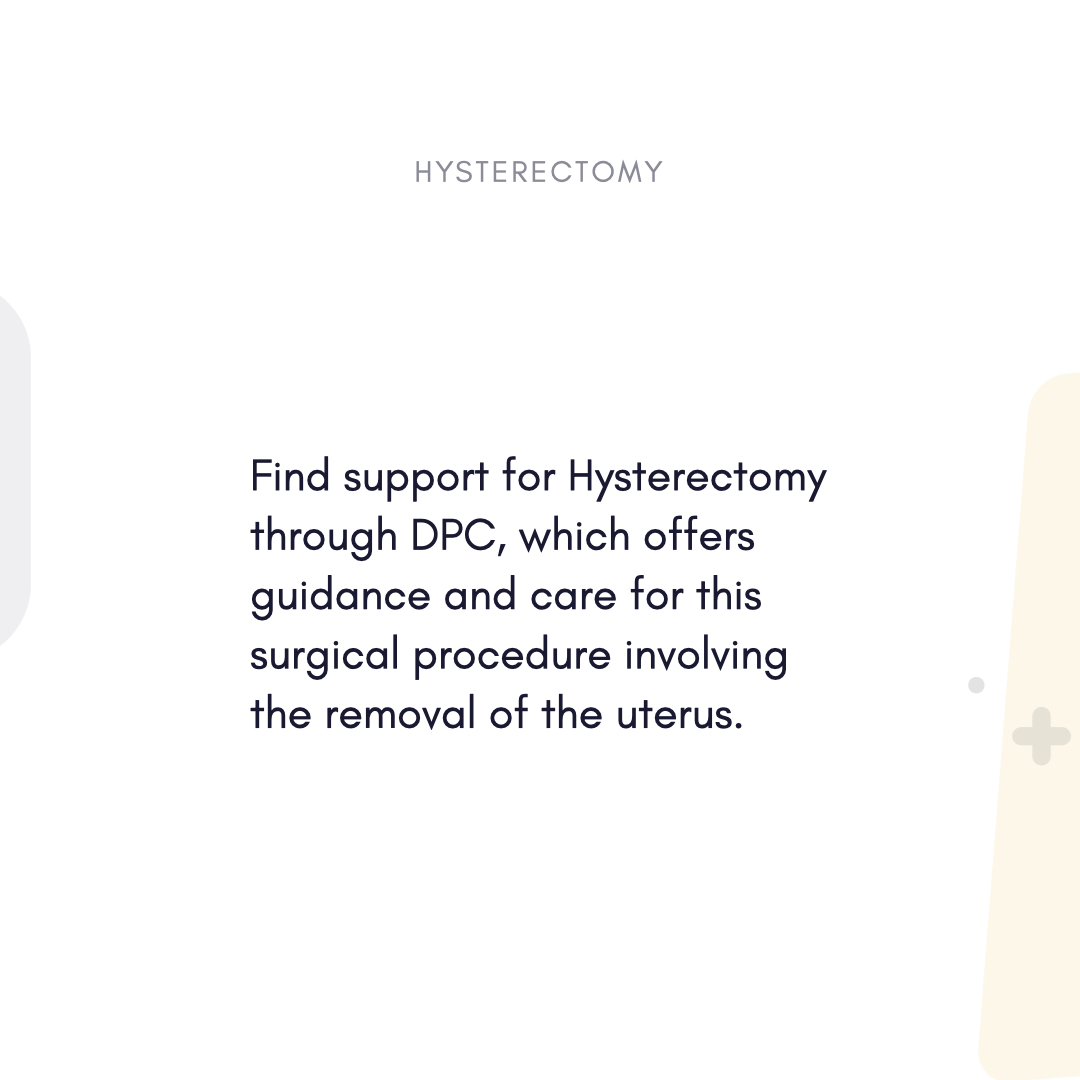Hysterectomy and Direct Primary Care (DPC): Your Path to Comprehensive, Compassionate Recovery
Usually done to treat fibroids, endometriosis, cancer, or chronic pelvic pain, a hysterectomy—surgical removal of the uterus—is a life-changing procedure. Although it will greatly enhance quality of life, recovery calls for careful post-operative care, emotional support, and long-term health monitoring. Many times, traditional medicine leaves patients negotiating uneven follow-ups and unanticipated expenses. A better approach is provided by Direct Primary Care (DPC), patient-centered, reasonably priced treatment that guides you through all stages of healing—from pre-operative preparation to lifetime wellness.

Knowledge of Hysterectomy
A hysterectomy can be total—removing uterus and cervix—partial—removing the uterus only—or radical—including surrounding tissues. It might also call for an oophorectomy—that is, removing the ovaries.
- Difficulties include:
- Restoring mobility, infection prevention, and pain management define physical recovery.
- If ovaries are removed during surgery, menopause, hot flashes, bone loss, or mood swings may follow.
- Emotional impact could be body image issues, anxiety, or grief.
- Long-term hazards include pelvic organ prolapse, heart problems, or loss of bone density.
Good management calls for individualized care to meet emotional as well as physical needs.
How DPC Changes Management of Hysterectomy
Under the membership model known as Direct Primary Care (DPC), patients pay a monthly fee—usually USD 50–USD 150—for unlimited access to their doctor. This means for patients undergoing hysterectomy no hurried visits, no surprise bills, and treatment catered to your surgical path and recovery objectives.
Individualized Attention Anchored in Expertise
Coordinating with surgeons and experts, DPC doctors guarantee flawless treatment in line with American College of Physicians (ACP) guidelines for patient-centered care:
- Preparation for pre-operative: Thorough assessments, thorough debates on surgical choices (e.g., laparoscopic vs. abdominal), and best health management (e.g., control of anemia, smoking cessation).
- Post-surgery care: Monitoring incisions, writing prescriptions for painkillers, and handling complications—such as blood clots.
- Hormone management: Juggling alternatives for cancer survivors or discussing risks and benefits of hormone replacement therapy (HRT) for surgical menopause.
- Mental health integration: Linking you to therapists or support groups for emotional healing.
Reasonably Priced, Transparent Treatment
Using wholesale-priced drugs, DPC clinics help to lower financial burden:
- HRT, antibiotics, or discounted painkillers.
- Discounted labs: Imaging at cost, hormone panels, and bone density scans.
- Early intervention and proactive complication control help to prevent ER visits.
Ongoing Support for Every Stage
Having 24/7 access to your doctor allows you to:
- Change your pain management plan or handle unexpected symptoms (such as fever or unusual bleeding).
- Use shared notebooks or online check-ins to track recovery benchmarks.
- Manage long-term medical needs including cardiovascular tests or pelvic floor therapy.
DPC's Customized Hysterectomy Management
DPC shapes treatment to fit your particular requirements:
- Surgical type: Tailoring laparoscopic, vaginal, or abdominal recovery schedules.
- Menopause management: Non-hormonal treatments (e.g., SSRIs for hot flashes) or customized HRT plans.
- Lifestyle choices: Stress-reducing methods, exercise programs to rebuild strength, and dietary plans for bone health.
- Preventive care: Mental health check-ins, annual pelvic exams, and cardiac screenings.
Real-Life Success Stories
- Case 1: After a total hysterectomy for endometriosis, Maria, 45, suffered with extreme pain. Early on, her DPC doctor found a minor infection, changed her antibiotics, and put her in touch with a pelvic floor therapist. After six weeks, Maria started to move again and went back to work.
- Case 2: Following ovarian removal, 52-year-old Linda started surgical menopause. Her DPC doctor ordered a bone density scan, prescribed low-dose HRT, and teamed with a nutritionist to avoid osteoporosis. Linda avoided fractures and her hot flashes started to go.
Frequently Asked Questions: DPC and Hysterectomy
- Q: How long with DPC support does recovery take?
A: Most patients return to light activity in two to four weeks, but DPC guarantees tailored schedules depending on your type of surgery and condition.
- Q: DPC seems reasonable for post-hysterectomy treatment.
A: Certainly! Most cut on specialist co-pays, imaging, and drugs. Usually, memberships run less than a cable bill.
- Q: If I need a specialist, can DPC assist?
A: Your DPC doctor guarantees consistent treatment by coordinating referrals to physical therapists, oncologists, or gynecologists.
Why DPC Benefits Hysterectomy Patients
DPC offers to change recovery by:
- Accessibility: Same-day visits for emotional crises or unexpected pain—aligning with ACP's focus on prompt treatment.
- Continuity: One doctor who monitors your long-term health risks and surgical history.
- Transparency in costs: Clear lab, medication, and consult pricing free of hidden fees.
- Holistic care: Addressing physical recovery, hormone balance, and mental health equally.
Take Charge of Your Healing Right Now
Not a definitive ending, a hysterectomy marks a new chapter. DPC provides a partner who will help you heal, adjust, and flourish—one who combines medical knowledge with relentless support.
- Direct Primary Care gives you:
- Personalized plans for emotional wellness, hormone balance, and pain management.
- 24/7 access to address anxiety or setbacks including unexpected symptoms.
- Financial clarity helps you focus on healing rather than debt.






